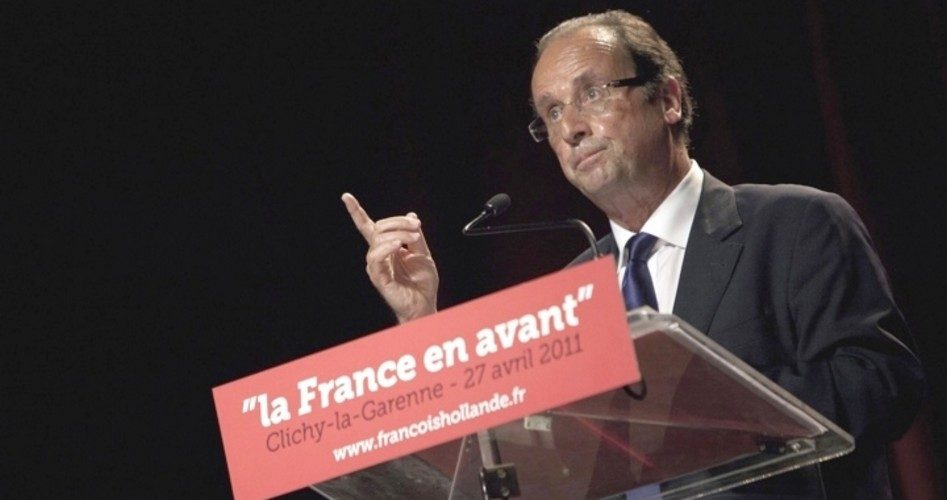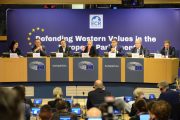
Does a person’s religion help determine his or her decisions in political elections? While most people would agree there is often a high degree of correlation between religious and political identification, rarely does the linkage stand out as strongly as it did in the recent presidential elections in France.
According to stories from the International Islamic News Agency (IINA) and other news outlets, a survey of 10,000 voters documented an almost unimaginable correlation between religious identification and one’s choice for President. According to IINA, Francois Hollande was the only candidate of Muslims, while Roman Catholics overwhelming backed the failed bid by Nicolas Sarkozy to win reelection:
According to a survey of 10,000 voters conducted by Opinionway for Le Figaro (not online), 93 percent of French Muslims voted for Francois Hollande in the second round of the French election, La Vie reports.
Another poll put Muslim support for Hollande at 85 percent.
A prior Opinionway survey showed that 59 percent of Muslim voters (numbering about two million in total) voted for Hollande in the first round of the French elections, with Sarkozy only managing four percent.
“It is the mark of a true rejection of Nicolas Sarkozy” said Julien Goarant, research director at Opinionway. Sarkozy’s attempts to woo Far-right voters and question the role of Islam (especially Halal meat) in France also did not go unnoticed.
On the flip side, a poll for La Vie showed that 79 percent of practicing Catholics voted for Sarkozy, with Hollande cornering only 21 percent of their vote. But 70 percent of those considering themselves “without religion” went with Hollande, according to Le Figaro.
In essence, according to the poll, Hollande was literally overwhelmingly received as the candidate of both the godless and Muslims in France. While many may have made their choice based on rejection of Sarkozy rather than support for Hollande, the degree of correlation between religious belief — or lack thereof — and one’s candidate is striking.
Of course, religion was hardly the only factor in the French election; the appalling state of the European economy and the looming collapse of the euro was far from a trivial consideration for voters as they went to the polls. Hollande’s implausible proposal to reduce the deficit to zero percent of Gross Domestic Product by 2017, while at the same time ruling in a way consistent with his socialist agenda seems unlikely to be realized. Still, it was undoubtedly a popular proposal with an electorate that understands that deficit spending has virtually bankrupted most Western governments — even as they remain unwilling to cope with the reality that only profound reductions in government spending can stem the unfolding destruction of the economy.
Another point worth remembering is that which is made in an article by Mary Margaret Ryan for the Berkeley Center for Religion, Peace and World Affairs, who observed that 57.2 percent of the French electorate is Roman Catholic, while only 5 percent of the electorate is Muslim. Certainly, the Muslim vote was far from being the only factor in the election of Hollande, but it was still a factor, and as the Muslim population of Europe continues to grow, it will likely exhibit a concomitant growth in political power, if such a pattern of voting continues in the future. Also, as Ryan observes, the high degree of correlation between religious identification and voting pattern occurred in an environment in which public discussions of one’s religious beliefs is generally frowned upon:
… I was curious to hear his thoughts about the role that religion, often considered a crucial element in American elections, might play in France, where laïcité — roughly, a kind of secularism — restricts the overt display of religious symbols and markers, and religious practice is often a strictly private affair, practiced primarily in the home. In following the elections here, I’d seen relatively little in the way of overt scrutiny of either the religious affiliations of candidates or proposed social legislation, but I knew from experience around the dinner table, that religion did come into play, even if it was largely within the private sphere.
The recent elections in France have demonstrated that a person’s religious beliefs do not exist in abstraction from the the rest of their worldview, and the person who believes that their religious affiliation is not a significant factor in their overall worldview may be speaking more accurately than they may realize.
Photo: French Socialist Party former first secretary and candidate for the party’s primary elections for the 2012 presidential election Francois Hollande gestures as he delivers a speech during his first campaign rally in Clichy, east of Paris, April 27, 2011: AP Images


